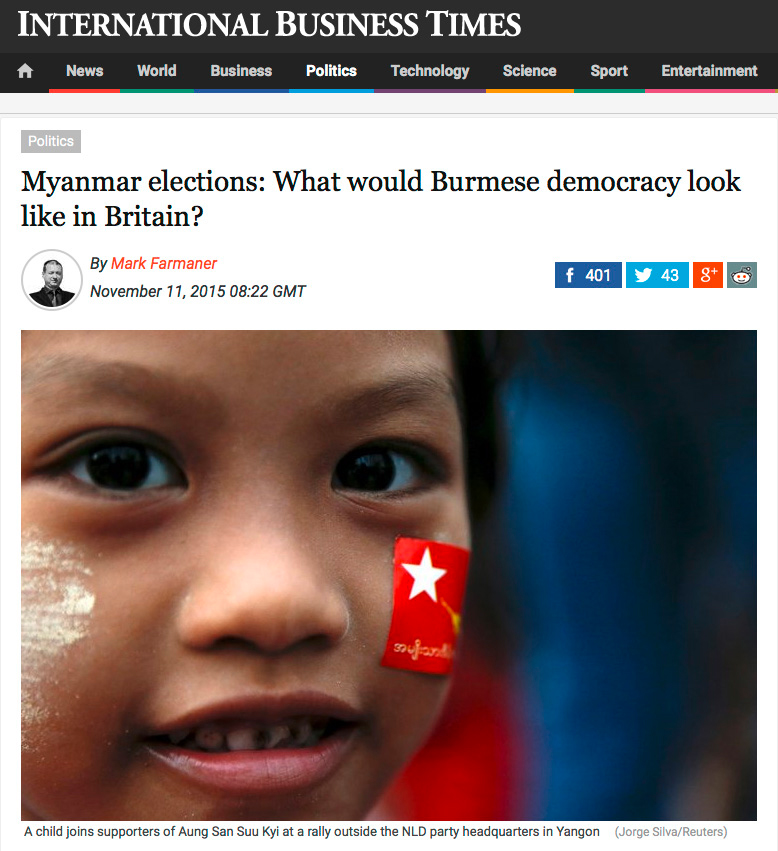Article by Mark Farmaner, director of Burma Campaign UK, in the International Business Times
People are rightly celebrating what looks like a huge victory for Aung San Suu Kyi’s party, the National League for Democracy, in the elections held in Burma on Sunday (8 November). But is this really the end of military rule? Not by a long shot.
Applying Burma’s military drafted constitution and rules of Sundays election to the political scene in the UK reveals the scale of the challenges a new NLD government will face, and why the people of Burma will need our continued support to win genuine freedom for all.
- The election was only for 75% of the seats in the British parliament. After the election, the head of the British Army chooses soldiers for the other 25% of seats.
- The fee for standing as a candidate was more than the average annual income, so smaller parties struggled to field many candidates.
- The head of the main opposition party is banned by law from becoming prime minister even if his or her party wins the election.
- While the election was going on, the British army was attacking civilian villages in Scotland and Wales. British soldiers were raping women, torturing and shooting farmers, bombing and burning villages, and thousands of people were fleeing for their lives. Two civilians were shot and killed by the British army on election day. The British government and British army stopped UN and other aid agencies from giving aid to refugees fleeing the attacks. This was barely mentioned during the election campaign.
- Voting was cancelled in large parts of Scotland, Wales and Northern Ireland, ostensibly for security reasons, which by co-incidence have voters who don’t tend to vote for the ruling party.
- The old parliament can carry on sitting for almost three months after the election, with MPs who were not re-elected passing laws which the population opposes.
- When the new parliament does finally get to sit, it chooses the prime minister. The prime minister does not have to be an MP. If the person chosen as prime minister is an elected MP, they have to resign from parliament.
- The British soldiers in parliament get to choose one of two deputy prime ministers. This will be serving soldier.
- After parliament chooses the prime minister, the prime minister does not have to go to parliament again. There is no weekly question time. The prime minister doesn’t have to answer questions from MPs.
- The prime minister chooses most government ministers. These ministers do not have to be MPs. If an MP is made a government minister, they have to resign from parliament. The parliament has no power to call on ministers to answer questions on policy.
- Regardless of who wins the election, the head of the army chooses the home secretary, the defence secretary, and the ministers for Scotland, Wales and Northern Ireland. These are usually serving soldiers. As such, the British government will not have control over the police, justice system, MI5 or MI6, the military, or over key areas of policy in Scotland, Wales and Northern Ireland.
- The defence secretary answers to the head of the army, not the other way round.
- The army sets its own budget, not government or parliament. The military budget is far higher than combined spending on the NHS and education.
- The emergency COBRA committee is a permanent body with fixed membership. It is constitutionally more powerful than the British government and parliament. The army chooses six of its eleven members, so they always have a majority.
- The British government and parliament cannot change the way Britain is run in any constitutional way, even if every single elected MP supports the change, unless the army also agrees with it.
- The army controls lots of Britain’s biggest companies, even the biggest brewery, and keeps the profits for themselves. The profits don’t enter the official government budget.
- The army has the constitutional power to take power over all or part of the country if it decides there is a threat to national security or unity.
We would never accept this in the UK, so how can we tell people in Burma that something is better than nothing, that at least this is better than what there was before, that progress is being made, and to be patient? The people of Burma have the right to the same freedoms as we have in the UK. Burma isn’t a democracy yet.

